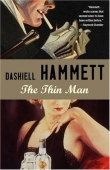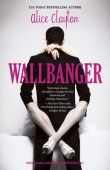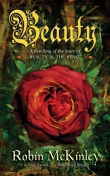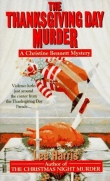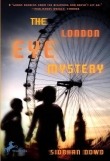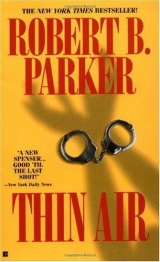
Текст книги "Thin Air"
Автор книги: Robert B. Parker
Жанр:
Крутой детектив
сообщить о нарушении
Текущая страница: 5 (всего у книги 14 страниц)
Chapter 11
I started at Proctor Police Headquarters. It was a gray granite building, near the gray granite City Hall. It had been built in the British Imperial style of the nineteenth century when a lot of American public buildings were being erected by people filled with swagger and destiny. It had been shiny and new once, when the WASPs ran the city, and the mills pumped money into everyone's pockets. But now it was hunched and crumbled like the city, buckling beneath the weight of impoverishment. There was graffiti on most of the walls, and litter washed up against the gray stone foundation. The windows were covered with wire mesh, and one of the glass panels in the front door had been broken and replaced with unpainted plywood. It looked like it wasn't exterior plywood either, because it had already begun to blister in the damp spring air, and the ends were starting to separate.
There was a sign on the duty officer's desk in the high lobby. It said Officer McDonogh. Behind the sign, seated at the desk, reading a newspaper, was a fat cop with his tie down and the neck of his uniform blouse unbuttoned. He seemed to be sweating a lot even though it wasn't hot, and he had a white handkerchief tied around his neck. A cigarette sent a small blue twist of smoke up from the edge of the desk, where it rested among the burn marks.
I said, "You McDonogh?"
He looked up from his paper, as if the question were a hard one, stared at me for a minute, and shook his head.
"Naw. Sign's been there since the war. What do you want?"
"Billy Kiley still Chief of Detectives?" I said.
"Naw, Kiley retired three, four years ago. Delaney's Chief now. You know Kiley?"
He picked up the cigarette, spilled some ash on his belly, and took a drag.
"I used to," I said, "when I was working for the Middlesex DA."
"Well, he's gone. You want to see Delaney?"
"Yes."
The fat cop jerked his head down the corridor behind him. "Last door," he said and picked up the phone as I walked away.
The corridor had once been marble, and some of it still showed above the green-painted Sheetrock that had been layered onto the lower walls like an ugly wainscotting. Threadbare brown carpet covered the floor. The corridor was long and on each side of it were pebbled glass doors with the names of the occupants stenciled on the glass. Identification and Forensic. Traffic. Juvenile. Delaney's office was at the end, a big one, with palladian windows on two sides. The ceilings were high. There were a couple of yellow oak file cabinets on the wall to my right. Near the left wall, a conference table was littered with crumpled Coke cans, overturned foam coffee cups, some ash trays full of cigarette butts, and the faint traces of powdered sugar where someone had polished off a donut. Beyond the conference table was the half-ajar door to a private washroom. I smiled when I saw it. They don't build them this way anymore. Delaney was just putting the phone down when I came in. He looked a little surprised, as if people didn't come in very often.
"My name's Spenser," I said.
"So, what's the Middlesex DA want with me?" Delaney said.
He was a tallish man, gone soft, with a lot of broken blood vessels in his cheeks, and an ugly red vinyl hairpiece on top of his head. It didn't match his sideburns, but it probably wouldn't have matched anyone's sideburns except maybe Plastic Man's. He or the guy out front had confused the part about I-used-to-work-for-the-Middlesex-DA. I decided not to clarify it.
"Looking for information on a guy named Luis Deleon."
"You try 411?" Delaney smiled. He had big yellow teeth like a horse.
"He's not in the phone book," I said.
"Why you asking about him?"
"Missing persons case I'm on," I said. "Woman named Lisa St. Claire. I thought Deleon might know something about her."
"Why do you think that?"
"She's married now to somebody else, but they used to date."
"He a Cha Cha?"
"Yeah."
"She's Anglo?"
"Un huh."
Delaney shook his head. He glanced over toward the washroom and then glanced back at me.
"You think she's with him?"
"I don't know," I said. "I just thought I'd talk with him. See what he knew. You ever hear of him?"
"Deleon don't even sound spic, does it? Doesn't matter. Fucking cucarachas change their name around here every other day."
He looked at the washroom again and licked his lips. "You wanna excuse me," he said. "Got to use the facilities for a minute."
"Sure."
He got up and headed for the lav. The door closed. I heard him cough, a deep ugly sound, then some silence. Then the flush of the toilet. The door opened and Delaney came out. He looked calmer, and as he passed me on the way to his desk, I smelled the booze on him. He sat down at his desk, his eyes bright. Booze was what he'd gone to the lavatory for. The toilet flush was just camouflage.
"So you think some spic's got your girl," he said.
I shook my head.
"I don't know if anyone's got the woman," I said. "She may be in Augusta, Georgia, for all I know, listening to Ray Charles records. You got any paper on this guy Deleon?"
"Paper? You mean like a rap sheet? Like a record?" Delaney laughed and the laugh turned into a cough and he coughed until he had to spit in his handkerchief. Still coughing, with his handkerchief pressed to his mouth, he stood and went back into the lav. He was gone a couple of minutes and when he came back he was carrying a bottle of Bushmill's Irish Whiskey. He sat down and put the whiskey on the desk near him.
"Fucking cough," he said when he got himself back to breathing. "Whiskey's only thing that'll stop it. You want a pop?"
"No thanks," I said.
Delaney took a cup from the side table by his desk and blew in it to clear the dust and poured maybe three inches of whiskey into the cup. He drank some. He downed about half of it and licked his lips. His eyes were bright now, and his face, reddened with broken veins, was brighter red.
"Ahh," Delaney said. "Mother's milk."
I knew the feeling. I'd never been a drunk, but I'd drunk enough to know the feeling, the sense of wellbeing as the whiskey eased through your system. It was a feeling that was hard to keep balanced and Delaney had the look of a man for whom it was getting harder. Keep the buzz without getting so drunk you couldn't function. It could be done, and Delaney was sort of doing it, living a life of never quite drunk and never at all sober, nursing the bottle in hidden sips until he got to the point where he couldn't hide the sips. It was no longer pleasure for him. It was need. Booze was no longer recreation. It was medicine.
"Where was I?" Delaney said.
"I asked if you had any record on Luis Deleon, and you laughed so hard you started coughing, and coughed so hard you started to spit up and then you went and got your bottle and now you're happy. You got any record on Luis Deleon?"
"What is this, spic fucking central? They all got records, and they all got twenty names and fifty addresses. You want to find out about some spic in Proctor, you talk to Freddie Santiago, or you go over to San Juan Hill. That's where it's happening for all the spics around here, man, Freddie or San Juan Hill. That's spic central, pal."
He drank the rest of his whiskey. And poured himself some more.
"Tell me about San Juan Hill," I said.
The whiskey was making him expansive. He leaned back in his chair. The bottle on the table now, no more pretense. He eyed the bottle. It was a new one, nearly full. He was able to relax. He knew where the next drink was.
"The spics are divided into two factions. One of them is San Juan Hill, the other one is Freddie Santiago."
"Is San Juan Hill a place?"
"Yeah, north end of the city. It used to be Irish and when it was we called it Galway Bay. My mother was born there. Then the Cha Chas came in and we moved out and now it's San Juan Hill."
"And Freddie Santiago?"
"Guy runs a place called Club del Aguadillano in the south end of town. He's the establishment, you know what I mean, sort of a spic Godfather. Kids in San Juan Hill broke with him maybe five, six years ago, and we don't know how organized they are, but you're in San Juan Hill, you're on the other side of whatever fight Freddie's in."
He sipped some more whiskey, held it in his mouth, then tilted his head and let it trickle down his throat. "You got anybody in there?"
"Anybody in where?"
"In San Juan Hill, in with Freddie Santiago."
"Shit no, man, Anglo won't last ten minutes under cover with one of the spic outfits, fuckers don't even speak English, most of them."
"I was thinking you might have some Hispanic officers."
Delaney laughed, started to cough, and swallowed some whiskey. The coughing subsided.
"His-pan-ic officers?" he started to laugh, caught himself, and drank again. "You think we're going to give one of those assholes a badge and a gun? They'd pawn the badge to buy dope and stick up the pawn shop afterwards."
"Any Spanish-speaking officers on the force?"
"Shit no. Freddie speaks English. We get along good with Freddie."
"I'll bet you do," I said.
Delaney paid no attention.
"Freddie's a businessman," Delaney said. "Runs a tight ship."
There was admiration in Delaney's voice.
"Gets a lot of dope and pussy traffic from the prep-school kids come in from Andover, and he don't want to scare them away. Walk around the south end, the streets are clean, the street lights work. There's zero street crime in Freddie's area."
"How about San Juan Hill?"
Delaney shook his head.
"Dodge City," he said. "Bunch of coked-up gang bangers. All we can do is pen them in up there, keep it on the Hill."
"You think Deleon might be connected to Santiago?"
"Deleon." Delaney shook his head, fumbled on the desk for his bottle, poured a little more into his cup. "What kind of fucking Spanish name is that? De-le-fucking-on?"
"Probably one of Ponce's offspring," I said.
"Well I don't know nothing about him."
"Could he be on San Juan Hill?"
"Sure, he could be up there, pal. Fucking Elvis could be up there singing `You ain't nothing but a hound dog,' you know?"
"Think Freddie Santiago would know?"
"Got no way of knowing, pal. Whyn't you go ask him?"
"Probably will," I said.
"You better ask nice, state cop or no."
"I'm not a state cop."
"You said…"
"I said I used to work for the Middlesex DA. I don't anymore. I'm private."
"Private? A fucking shoofly? Get the fuck out of here before I bust you for impersonating a police officer."
"Or vice versa," I said.
"Beat it," he said.
I took his advice, and as I went out the door I looked back and smiled a friendly smile and said "Skol." and closed the door behind me.
The fat cop at the desk was still sweating as I passed him.
"How is he?" he said.
"Gassed," I said.
The cop nodded.
"He wasn't a bad cop, once," the cop said.
"He's a bad cop now," I said.
The fat cop shrugged.
"His brother's a City Councilman," he said.
Chapter 12
San Juan Hill, when I found it, made you think maybe God liked cinema noir. The streets were narrow and the three-deckers crowded down against them. The buildings were uniformly stoop-shouldered and out of plumb, as if age and sequential squalor had sapped the strength from the wooden framing. The buildings were immediately on the sidewalk, there were no yards. There was no grass or trees, no shrubs, not even weeds, pushing up through the asphalt. Between each building was a hot-topped driveway, some with new cars parked there, some with rusting hulks that had been parked there since San Juan Hill was Galway Bay. The graffiti was intense, and brilliant; an angry, aggressive plaint of garish color on almost every surface. Somebody see me! Anybody! A swarm of young kids on mountain bikes flashed out of an alley and swooped by me. One of them scraped something, probably a 20d nail head, along the length of my car as he passed. I thought about shooting him, decided it could be construed as overreaction, and chose instead to ignore it in a dignified manner. I wondered how these impoverished children could afford bright new mountain bikes. Depended, I supposed, on one's priorities. There were trash cans out on every corner, but no sign that the city had been by to pick them up. Many had been tipped over, probably by the fun-loving kids on the mountain bikes, and the trash was scattered on the sidewalks and into the street. There were dogs nosing in the trash. They were mostly the kind of generic mongrel that seems to have bred itself back to the origin of the species, twenty, thirty pounds, gray-brown, with a tail that curled upward over their hindquarters. They were so similar they looked like a breed. They all had the low-slung furtive movements of feral animals. None of them looked friendly. Most of them looked like they didn't eat regularly. And what they did eat they probably foraged. The shades in all the windows appeared to be drawn. There were a lot of kids on the streets, but very few people over the age of twenty. Occasionally there was a storefront with hand-painted Spanish language signs in the window. Cosnidas, cervezas. Most of the kids had on colorful warmup jackets, and baggy jeans and expensive sneakers. Probably traded the mountain bikes in on the sneakers as they passed through puberty. Under the weak spring sun, the graffiti, the warmup clothes, and the sneakers were nearly the only colors in San Juan Hill. Everything else was the color of the dogs.
Near the center of San Juan Hill stood an ugly pile of angular gray stones which had blackened with time. It was a Roman Catholic church with a wide wooden door painted red. The door and most of the church walls were ornamented with graffiti. There was a sign out front that identified the church as St. Sebastian's, and listed the scheduled masses. The sign was covered with graffiti. I parked out front of the church. In San Juan Hill you could park anywhere.
Inside the church, in the back, there were three old women wearing black shawls over their heads. I had read somewhere that the Catholic church no longer required women to cover their heads when entering, but these did not look like women who would jump onto every new fad that came along. The women were saying the rosary, their lips moving silently, fingering the beads softly, sliding them along as they said the prayers. Down front a solitary old man in a black suit with no tie and his white shirt buttoned to the neck was sitting in the first pew. He didn't show any signs of prayer. He wasn't sleeping. He simply sat gazing straight ahead.
As I walked down the aisle of the church, a middleaged priest in a black cassock came out of the sacristy and met me near the altar rail.
"May I help you?" he said softly.
He was a modest-sized guy, wiry and trim with white hair and a red face.
"Is there someplace we can talk, Father?"
The priest nodded.
"Perhaps we can step out onto the front steps," he said, "so as not to disturb the worshipers."
We walked back up the central aisle in the dim, candle-smelling church, and out into the thin early spring brightness. At the foot of the church stairs my car sat at the curb, a long scratch gleaming newly along the entire passenger side. The priest looked at it.
"Your car?" he said.
"Yes."
"Welcome to San Juan Hill," the priest said. "Children on bicycles?"
"Yes."
"They like to do that," the priest said. "They particularly like to surround Anglo women, and when the car stops to beat them."
"Because they like to?"
"Because they like to."
"Sure," I said. "I'm looking for a young man named Luis Deleon. He might be here in San Juan Hill."
"Why are you looking for him?"
"As a means to an end," I said. "There's a woman missing, I'm looking for her. I'm told she once had a relationship with Deleon."
"Is this an Anglo woman?"
"Yes."
"You would not bother to look for a Latin woman."
"I look for anyone I'm hired to look for."
"You are not a policeman then?"
"No. I'm a private detective."
"And you have a gun," the priest said, "under your coat."
"You're very observant, Father."
"I have seen a lot of guns, my friend," the priest said.
"Yes, I imagine you have," I said.
The priest looked out over the gray and graffiti landscape of Proctor. Somewhere a car squealed its tires as it went at high speed around a corner. In the asphalt and chain-link playground across from the church, three kids sat against the wall smoking, and drinking from a wine bottle in a paper sack. A huge dirty gray cat, slouched so low that its belly dragged, padded out of the alley next to the church carrying a dead rat.
"Not what I imagined when I left the seminary thirty years ago," the priest said. "Bright, fresh-scrubbed children gazing up at me, learning the word of God. Green lawn in front of the church, bean suppers in the basement, young couples getting married, solemn funerals for prosperous old people who had died quietly in their sleep."
The priest looked at me.
"I was supposed to live a life of reverence," he said. "I was supposed to visit suburban hospitals, where the staff knew and admired me, and give communion to people in flowery bed linens, with bows in their hair."
"The ways of the Lord are often dark, but never pleasant, Father."
"Who said that?"
"Besides me? A guy named Reich, I think."
"I don't know him. I hope he is not correct."
"You know Deleon?" I said.
"Yes."
"You know where I can find him?"
"No, I have not seen him since he was small. His mother used to bring him, then, but she was a desperate woman and one day she killed herself, God rest her soul. I never saw Luis again. But I hear things. I hear he has become an important person in San Juan Hill."
The priest paused and looked at me.
"And I hear he has become very dangerous."
I nodded.
"You should be careful if you plan to approach him," the priest said.
"I'm fairly dangerous myself, Father."
"Yes, you have the look. I have seen it far too often not to know it."
"If you were me, Father, where would you look for Deleon?"
"I don't know:"
"Would any of your parishioners know?"
"If they do, they would not tell me."
"You're their priest."
"Here I am not their priest. I am a gringo."
I nodded. The priest was silent. I could hear a boom box playing somewhere.
"If you do not speak Spanish, no one in San Juan Hill will speak with you."
"Even if they speak English?"
"Even then."
"How about Freddie Santiago?" I said.
"He might speak to you, if he thought it served him. But he is not in San Juan Hill."
"What would serve Santiago?" I said.
The priest thought about my question.
"There is no simple answer to that," he said. "Santiago is an evil man, of this there is no question. He is a criminal, almost surely a murderer. He deals in narcotics, in prostitutes, in gambling. He sells green cards. He controls much of what happens in the Hispanic community here, which is to say most of Proctor."
"Except San Juan Hill," I said.
"Except San Juan Hill."
"So what's the no-simple part?"
"He is not entirely, I think, a bad man. A poor person can get money or a job from Freddie Santiago. Wars among some of the youth gangs are settled by him. Paternity and alimony payments are often enforced by him. Every election he works very hard to get Hispanic people registered."
"And he probably contributes to the Police Beneficent Association," I said.
The priest smiled for a moment.
"I think it is certain," he said, "that Freddie Santiago contributes generously to the police. Have you talked to them?"
"I talked to the Chief of Detectives," I said.
"He was Irish?" the priest said.
"Yeah, Delaney."
"They are all Irish," the priest said. "The police, the school superintendent, the mayor, all of the power structure. They are Irish and they speak English. And the city is Spanish and speaks Spanish."
"You speak Spanish, Father?"
"Haltingly at best," the priest said. "I can still say a Latin mass, but I have not been successful with the language of my flock. I assume the police weren't helpful to you."
"They weren't."
"If she's with Deleon… an Anglo woman with an Hispanic man… for the police here, it would mean she was irretrievably tainted."
Six teenaged boys in baggy jeans and San Antonio Spurs warmup jackets swaggered by us on the sidewalk below. They looked up at us. It was not a friendly look.
One of them said something in Spanish. They all laughed.
"Did you understand what he said?" I asked the priest.
"He said, in effect, `Look at the eunuch in his dress,"' the priest said. His red face held no expression. "I've heard it before."
"If they would talk to me, is there enough English spoken in Proctor for me to ask questions and understand the answers?" I said.
"They will not talk to you, and if they would, I do not think they could," the priest said.
"But Freddie Santiago speaks English," I said.
"Very well, I've heard. If you talk to him, be respectful, and very careful. He is a deadly adversary."
"Wait'll he gets a load of me," I said. "How'd you end up here, Father, in the tail end of hell's half acre?"
"A priest's duty is to serve where God sends him," he said.
As he spoke, he was looking at the barren asphalt playground where the three kids were still drinking wine and smoking dope against the graffiti-covered handball wall.
"And… I drink," he said.


